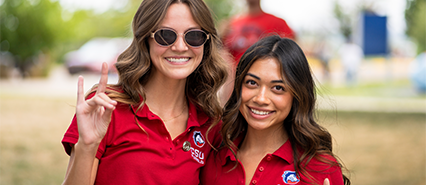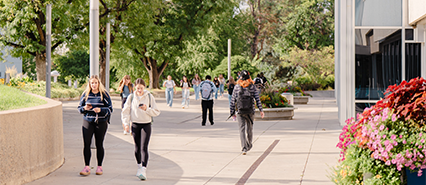The Pueblo Five: Rural Roots, National Impact
Release Date: September 19, 2024

The Little University That Could: How CSU Pueblo is Redefining Rural Leadership
In an era when higher education often seems like a high-stakes game of prestige and rankings, our small public university nestled in the heart of Colorado is quietly rewriting the rules. CSU Pueblo, with its modest enrollment of just under 4,000 students, is proving that sometimes, the most profound innovations in education come from unexpected places.
The university recently announced its 2024 Distinguished Young Alumni Award recipients, a quintet of professionals under 40 whose accomplishments read like a microcosm of America's most pressing challenges and opportunities. Their stories, reflects CSU Pueblo's ethos, and offer a glimpse into the university's role as what it calls the "premier incubator of future leaders from rural and Southern Colorado."
Take Heather Riganti, class of 2017, whose journey from top graduate to assistant principal represents the university's focus on educational leadership. Riganti, who is now pursuing a doctorate in early-career teacher retention, represents a new generation of educators grappling with one of the most critical issues in American education. Her trajectory from CSU Pueblo's halls to the frontlines of educational policy and practice suggests a program that doesn't just teach about education, but prepares students to reshape it.
Then there's Katie Hausman, a 2020 nursing graduate whose story reads like a parable of mental toughness in the face of crisis. Hausman's experience in the ICU during the height of the COVID-19 pandemic is a reminder of the real-world implications of academic preparation. Now, as an adjunct faculty member at her alma mater, Hausman trains future medical professionals. It’s the cyclical nature of knowledge and service which CSU Pueblo seems to cultivate so effectively.
Call Louis DeSantis the avatar of the fostered business acumen in the university’s. DeSantis is a 2011 graduate whose entrepreneurial spirit led him to expand his sign company across three states. But DeSantis's story isn't just one of individual success; his leadership in industry associations and commitment to supporting university athletics in time and funds speaks to the broader concern for community engagement that CSU Pueblo instills in its students.
Keenan Wyatt, class of 2019, presents perhaps the most intriguing juxtaposition of roles. A chemistry graduate pursuing cutting-edge sustainability research at the National Renewable Energy Laboratory, Wyatt also served as a Sergeant in the Colorado National Guard during the early stages of the pandemic. This duality – the scientist and the soldier – underscores the versatility that CSU Pueblo seems to foster in its students, preparing them for a world where adaptability is as crucial as expertise.
Rounding out this illustrious group is Thomas "Tommy" Farrell, a 2010 political science graduate whose post-university journey reads like a roadmap of civic engagement. From growing Pueblo's LGBTQ+ Pride Festival to serving on the local school board, Farrell's story encourages the university's approach to political science education. Here, politics isn't just an academic exercise; it's a training ground for future governance. Students don't just study politics in the abstract; they're prepared to roll up their sleeves and engage in the messy, vital work of democracy.
CSU Pueblo's secret sauce isn't just in its curriculum; it's in the intangible alchemy of its community. The university has coined the term "Pack Familia" to describe its diverse, interconnected student body. It's a place where future nurses rub shoulders with budding entrepreneurs, where aspiring chemists debate ethics with political science majors. In an age of echo chambers and polarization, there's something almost radical about this intentional cultivation of diverse connections.
"You learn to ask intelligent questions and listen attentively to their responses," explains Daniel Minich, the university's Director of Alumni Relations and Engagement. "This is really an underrated leadership skill, one that anyone could cultivate but that few people actually do."
In a way, CSU Pueblo is addressing a paradox of our time: as the world becomes more interconnected, our individual bubbles often become more insular. By fostering an environment where students must engage with a wide array of perspectives, the university is preparing them for leadership in a complex, multi-faceted world.
This makes sense, given CSU Pueblo's status as a Hispanic Serving Institution with a strong military-friendly focus. In a nation where discussions about diversity often focus on urban centers, CSU Pueblo reminds us that rural America, too, contains multitudes. The university's success in fostering leaders across various fields – from education to healthcare, from business to public service – suggests a model of inclusive excellence that larger, more renowned institutions might do well to emulate.
Even more astounding, as higher education grapples with questions of relevance and return on investment, CSU Pueblo offers a compelling counter-narrative to the notion that only elite institutions can produce transformative leaders. It suggests that sometimes, the most fertile ground for innovation and leadership is found not in the hallowed halls of ivy-covered buildings, but in the rich soil of America's heartland.
In the end, what CSU Pueblo is cultivating goes beyond academic achievement or career success. It's nurturing a kind of civic empathy – the ability to see the world through multiple lenses, to find common ground in unexpected places. In a nation increasingly divided along rural and urban lines, institutions like CSU Pueblo might just hold the key to bridging that gap, one curious, attentive conversation at a time.
Many often look to the coasts or major metropolitan areas for innovation and leadership. These DYA awardees are proof positive that transformations can come from the heart of the country. In education, as it is in life, it’s not the size of the institution that matters, but the scope of its vision and the depth of its commitment to its students and community.


